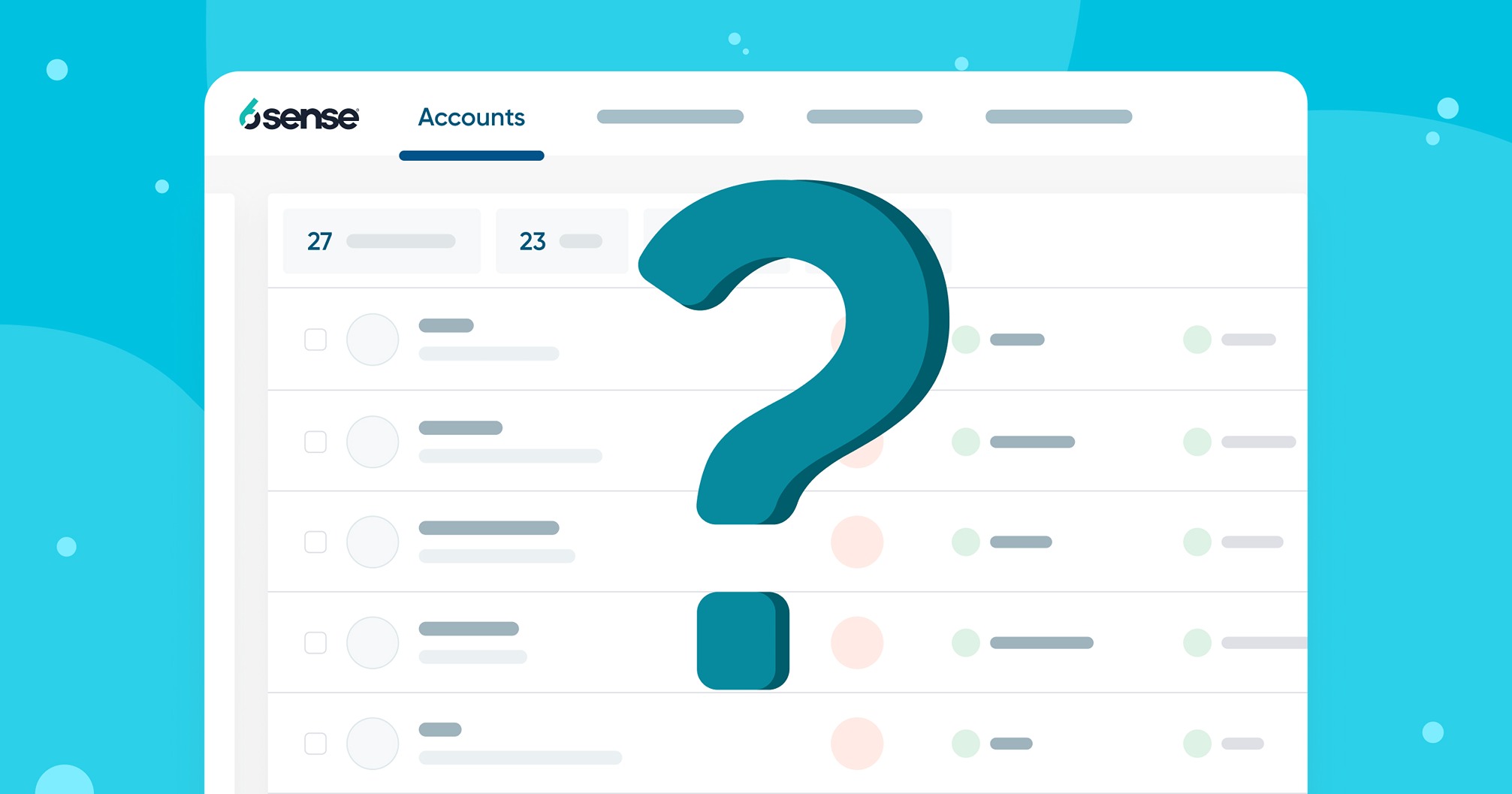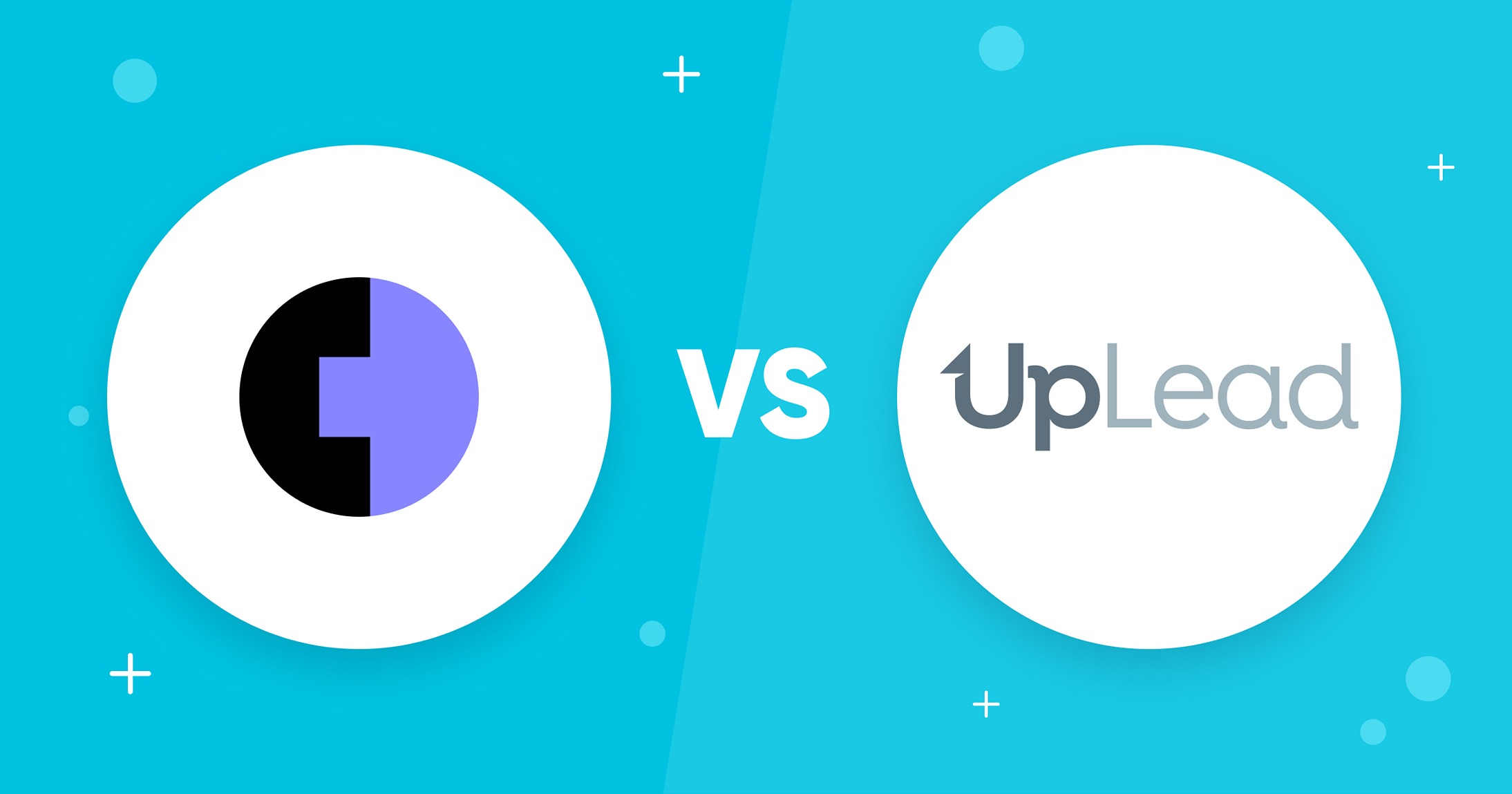Ryan Grant of Online Selling Experiment has been selling on Amazon since his college days. This isn’t simply a hobby or a side gig, though; Ryan made $5.9M in 2018 through his Amazon business, and this excludes the additional revenue that he gets from his eBooks, courses, and the coaching sessions that he offers.
In this UpLead Growth Chat, we sat down with Ryan to learn how anyone can sell things online at a profit. We also discuss how he’s built his Amazon business to the point where it generates $5.9M with only 10 hours worth of input from him per week.
To jump to specific segments of our interview, click on the relevant links from the Table of Contents above.
Early career and personal growth
Will: Your first foray into entrepreneurship was when you started selling items in college. What did you sell, and how exactly did you go about doing this?
Ryan: I mostly sold textbooks back then. It all started at the close of my first semester freshman year, when I went to the college bookstore to sell them my books. They offered what felt like a very low price compared to what I initially paid for them. This led to me looking into other options; I ultimately ended up selling my textbooks on Amazon.

My next semester, I started selling some books for my friends in return for a percentage of the sale. After that, I started buying textbooks directly from students on campus and reselling them. I did this together with a friend, and we were able to do this for about 2 semesters, and then we kind of ruined it.
Here’s what happened: instead of simply buying books at the end of the semester, we decided we could also make money when students were buying their books at the beginning of the semester. So we sat down and created a website that was similar to the college bookstore’s website. You’d select your class, professor, and then the book you need for the class would pop up.
Here, our site would display the book from Amazon instead of the bookstore. Obviously, the prices that you’d get on this site were MUCH lower than the bookstores prices. And because we were on the Amazon Associates program, we got a commission on every book we sold through the site.
Our site was well-received, and we made over $1,000 in commissions the first week it was live, but then things went south. My friend and I were “invited” to a meeting with someone from some sort of compliance / legal department from the university, and we were told that we had two choices: either shut the website down, or pay the school for the information we were utilizing. We couldn’t work out a deal, and ended up shutting the site.
Will: That must’ve been hard. What did you guys do after that?

Ryan: The next semester, we decided to go back to doing things the old-school way — we set up a table and attempted to buy students’ old books again. But after about 15 minutes in, the bookstore director came over with one of the security guys, and asked us to leave.
We obviously couldn’t do any sort of buying/selling in school anymore, so the next semester, we partnered with a local restaurant to buy books from their location. We gave away free slices of pizza to people who sold books to us, and this worked well for about one semester.
The next semester we called up the restaurant so that we could do the event again, but they shot us down. As it turns out, they worked out a deal with a local textbook store (unaffiliated with the university) to do something similar. Basically, the local bookstore called up the restaurant we were working with and asked them to support another local establishment (instead of doing business with us), and they agreed.
We quickly scrambled to find some other options, and we ended up working out a deal with a local apartment complex to buy books from their location. We pitched this as a service to the students staying there: they wouldn’t even have to leave the complex to sell their books.
We continued doing this for a few semesters, and even expanded to buying textbooks from restaurants and apartment complexes at three additional universities in Minnesota.
Will: That’s plenty of setbacks and pivots you encountered, but nicely done! What are your main takeaways from selling in college?
Ryan: I’d say my biggest takeaway is figuring out how to spot and take advantage of an “arbitrage” opportunity through market inefficiencies. This experience also opened my eyes up to the potential of selling online, and it taught me a valuable lesson about outsourcing to grow a business.
How Ryan sources for products: retail arbitrage, online arbitrage, and wholesale sourcing
Will: You source for products to sell via three main methods: retail arbitrage, online arbitrage, and wholesale sourcing. Can you break down each of these methods for us?
Ryan: Sure. Retail Arbitrage is the act of buying items at a physical store like a Walmart or Target, typically at a discount, and then selling the product on a different marketplace. Personally, I often use Amazon or eBay. I’ve done a full blog post on Retail Arbitrage which shares more details on the process – this can be found here.
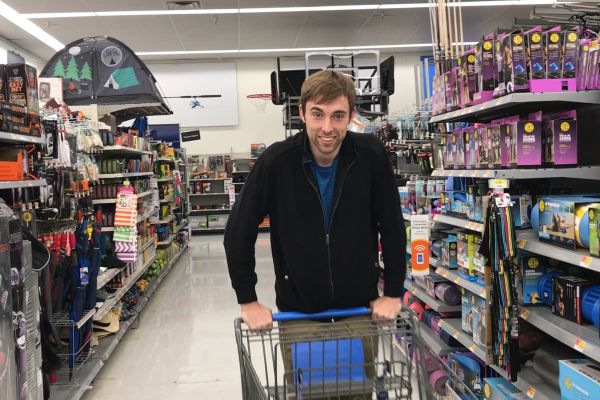
Online Arbitrage is very similar to retail arbitrage, but as opposed to buying in a physical store, you’re buying from an online retailer. For example, you would be buying from Walmart.com and then selling the product on Amazon. I’ve also done a full blog post on Online Arbitrage with tips and more details on the process, which you can check out here.
The combination of these two sourcing methods made up about 50% of my company’s sales in 2018, with the other 50% coming from wholesale sourcing (ie: buying from manufacturers and distributors of existing brands.)
With Wholesale Sourcing, you’d go to a company like Mattel and purchase product in bulk from them. Here, you’re buying in the same format as brick and mortar stores. With this strategy, you typically buy in relatively high quantities, and pay about 50% of the retail price of the item.
If you’d like to learn about the tools I use for these different sourcing methods, I have a full list of them on my website.
Building Online Selling Experiment, and hiring a team
Will: When you started selling online full time, you did monthly recaps of your sales performance, and even published your financial results online. You can find similar case studies nowadays, but they weren’t too common back in 2013. What made you decide to lay it all out, and share your numbers with the world?
Ryan: My overall goal when starting Online Selling Experiment was to hopefully show a case study of some successfully deviating from the “traditional” career path.
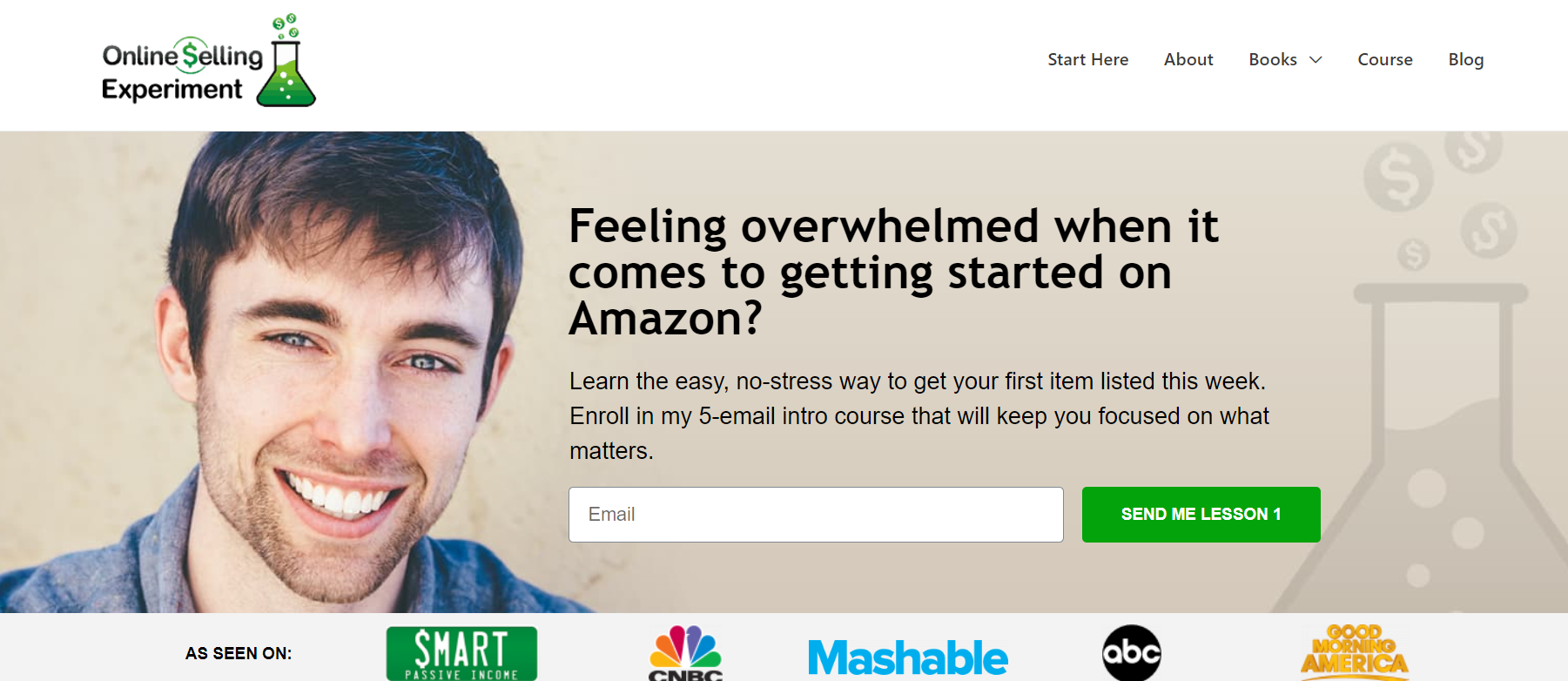
When growing up I felt that society was always steering me in the following direction: high school > college > get a job at a large company > work for 40+ years > retire.
Now, there’s nothing inherently wrong with that path, and it’s the right option for a lot of people. That said, it never really felt like the right path for me.
I’ve always wished that I could have seen that there were other options out there (back when I was still figuring out what to do in my life). Of course, it’s hard to say if I would have taken any of these other options, but I would have liked to know that I had the option.
So: my goal with the site was to hopefully show people another option — and that there are ways to make an income that deviate from the traditional career path.
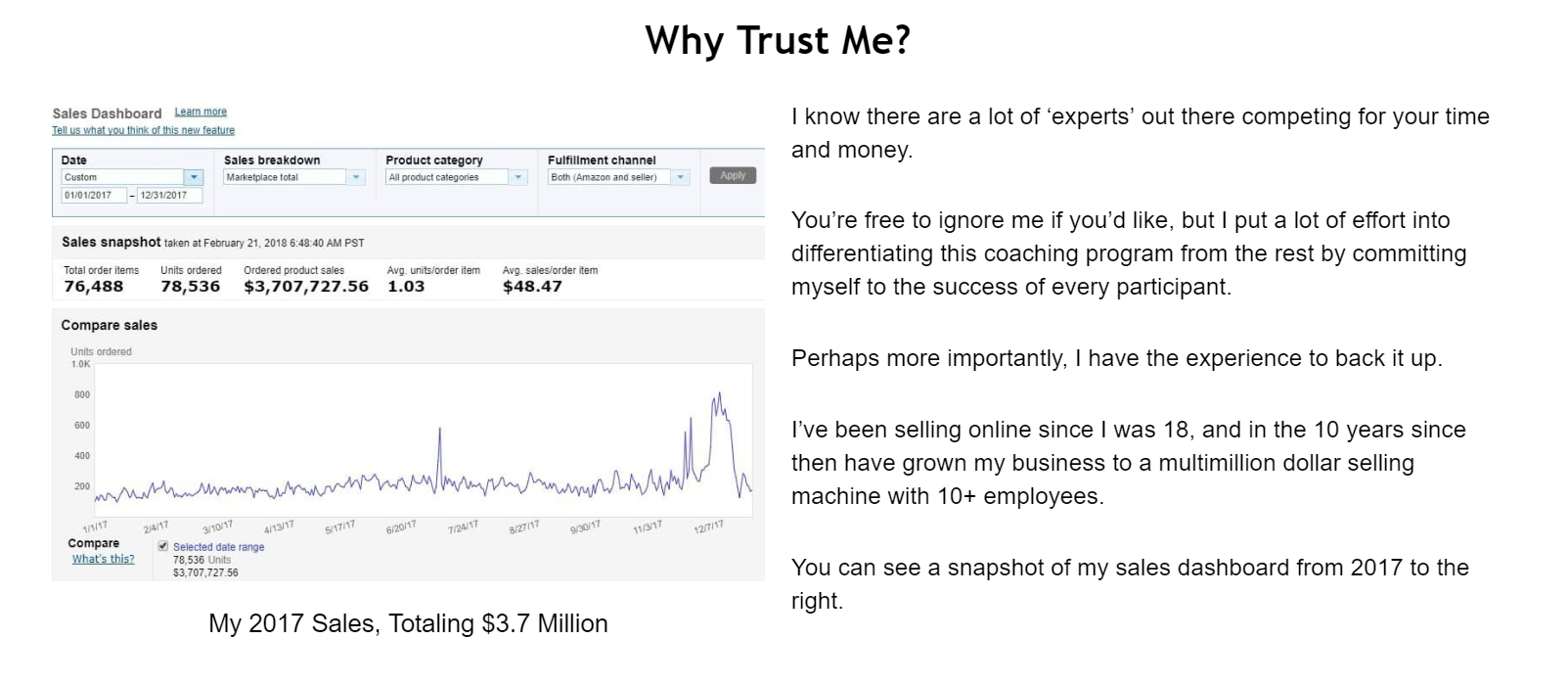
I thought that sharing my income reports was a good way to do that — if my readers could see that I was actually making money (and a decent amount of it!), they’d realize that being an entrepreneur is a perfectly legitimate path.
At the same time, I thought this sharing income reports would help me establish credibility, and get people interested in reading the content I was sharing.
Will: There’s plenty of entrepreneur porn out there, but what would you say is the one worst thing about owning your own online business?
Ryan: I’d say the worst thing is managing all of the compliance requirements. I’m talking about income taxes, sales taxes, workers comp, among other federal and state filing requirements.
Will: How many hours (per week) do you spend on running your Amazon store these days? How many hours do you spend on your coaching business?
Ryan: At this stage, I’ve put the right systems in place, so I only spend 10 hours per week or so on my Amazon store. I’m still very involved in determining the strategy, but the execution of the strategy is done by my team.
The coaching business typically takes about 10 hours per week as well, and the remainder of the time is spent on Online Selling Experiment, and different projects that I believe can grow the business. For example, I’ve been working on growing the sales for a Shopify site that I purchased about 2 years ago.
Will: You mentioned in a previous interview that the first employee you hired was a friend. Plenty of other entrepreneurs have said that they do not recommend working with friends and family — what’s your take on this?
Ryan: That’s a good question. Here’s how I’d put it —
“I think that working with friends or family is a double edged sword.”
On one hand, you already trust the person, and that’s important. On the flip side, it can be difficult to navigate conversations when things aren’t going smoothly. And now that you’re your friend’s boss or manager, the dynamic becomes different, and this might be problematic.
Personally, my experience is that having friends work in my business was extremely valuable (and it still IS valuable, till today). Thankfully, we’ve been able to navigate the different aspects of our relationships just fine.
“While it’s worked for me up to this point, I would also say that going forward, I don’t foresee hiring any other friends or family into my business.”
For other entrepreneurs, if you’re bent on hiring friends, you have to make sure things are as clearly defined as possible going in, and make sure that you can handle the different dynamics that will come with doing so.
Will: Makes sense. Can you share some examples of how you’ve defined things or drawn boundaries with your friends-turned-employees?
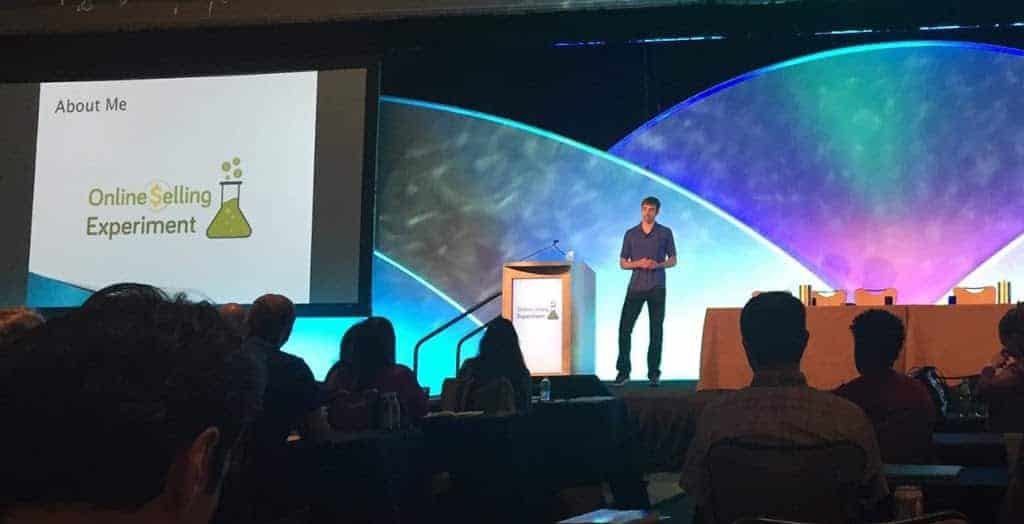
Ryan: In terms of defining things, we have an explicit conversation that work is work before ever getting started. Basically we talk about how at work, the relationship is different than just being friends, and make sure that we’re on the same page.
If I need to have a performance review or give someone constructive feedback, I might also preface it by saying something like “this is a work conversation.”
The goal is to establish that we should both act as professionals, and not let any of our biases as friends get in the way. s
Relying on Amazon vs diversifying your business
Will: In a previous interview, you talked about how you unwittingly sold a faulty product on Amazon, and this resulted in your Amazon seller account getting temporarily suspended. Did this impact your business strategy in any way?
Ryan: Yes, that was a scary time. You can read the full story in this blog post.
In terms of how it changed our strategy, moving forward, we only bought from suppliers who could give us invoices (that Amazon might request for when an issue arises). It’s important to have a receipt or invoice that shows a chain of custody back to the original manufacturer.
Will: Running in the same vein… by selling on Amazon instead of your own website, you’re essentially at the mercy of Amazon, and it can pull the rug from under your feet at any time.
Do you find this problematic? Do you encourage sellers to try and transition to selling via their own platform once they’re big enough?
Ryan: It’s concerning, yes — but I look at it as a risk / reward decision.
In my experience, the upside of being able to sell on Amazon far outweighs the potential downside (of being too reliant on it).
More specifically, if you purchase products on clearance or at a discount, as we typically do, there’s a very high probability we’ll be able to at least recoup the initial investment in the product if we sell it on a marketplace. So the downside on any capital invested is about break even or, say, a 25% loss, and the upside is very significant.
With that said, I do encourage sellers to be diversified. For example, we sell products on Amazon, eBay, Jet.com, as well as a couple of our own websites. As sellers grow, it’s definitely a good move to expand marketplaces, including selling through your own website.
Will: Now that Google has launched Google Shopping Actions, do you think that this will impact Amazon and Amazon sellers? Do you think entrepreneurs should utilize both platforms, or focus on just a single platform?
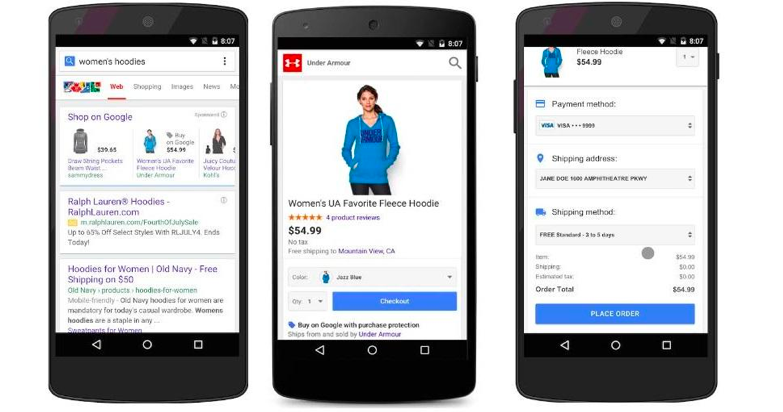
Ryan: I don’t see it having a huge impact in the next couple of years, but in the longer term, it might become another viable channel for sellers to distribute their products.
As for how many platforms to focus on, I think it makes sense to focus on just one platform initially.
“The goal is to master a single platform, and put the right systems in places.”
Doing this will free up your time and allow your business to run on autopilot, and once you’ve achieved that, go ahead and try out a new marketplace. That’s my personal rule: if everything that currently exists can keep operating, and I have extra bandwidth available, I’ll start something new.
Will: What are the 3 most common mistakes that you see Amazon sellers making?
Ryan: First off, not knowing their numbers. You should know exactly how much profit you project you will make on any inventory purchase.
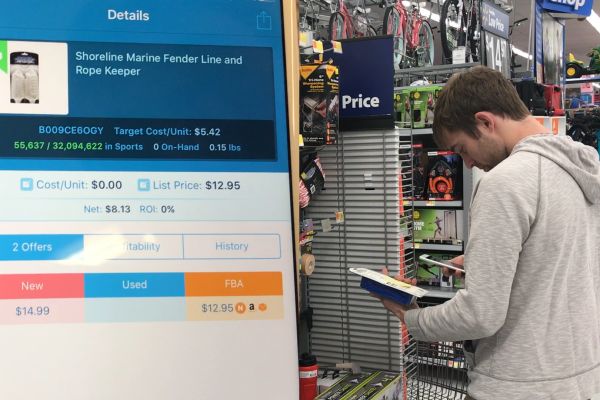
Next, not putting in enough time. I get emails from sellers who tried retail arbitrage, and they say they scanned 10 items that weren’t profitable, then determined that retail arbitrage doesn’t work. These folks haven’t really put in the time to explore the strategy, and they’re jumping to a conclusion way too soon.
Lastly, not understanding all of Amazon’s rules and policies. Amazon has a lot of policies in place to protect their customers and make sure they’re happy. Some new sellers gloss over requirements, and this ends up causing problems with their seller accounts.e
Marketing strategies and tips
Will: Can you share some tips and best practices for Amazon sellers who want to start running Sponsored Products ads for the first time?

Ryan: My recommendation is to initially run an “auto” campaign within sponsored product ads. Let that run for a week or two, and then you’ll be able to download a report of how your ads performed for different searches.
For the best performing searches, create manual campaigns. By doing this, you’re keeping what worked well, and removing what didn’t, and this helps you lower the cost of your ads.
Will: How’s your affiliate marketing strategy working out for you? Any tips to share for business owners who want to experiment with affiliate marketing?
Ryan: It’s working well, and it’s a nice additional stream of revenue to have.
“For affiliate marketing, my main tip is: only promote products which you personally use, and you KNOW will add value to your readers.”
I actually have a full series on affiliate marketing that shares a lot more details. You can read the first post in the series on how to get started with affiliate marketing here.
Will: When it comes to getting more coaching clients, what channels do you rely on? What percentage of your marketing budget do you put in each channel? Which channel has had the greatest ROI for you so far?
Ryan: For coaching clients and driving traffic to Online Selling Experiment, the two paid channels that I use are Google and Facebook. Right now about 75% of my budget goes to Facebook, and 25% goes to Google.
In terms of paid traffic, Facebook is working out better for us at this time. We do mostly retargeting ads on Facebook.
Paid traffic aside, a lot of traffic to my site is organic. Comparing paid and organic, organic is where we see the best overall ROI.
Revenue goals, and Online Selling Experiment’s evolution over the years
Will: How has Online Selling Experiment evolved from when it was first launched?
Ryan: The biggest evolution has been Online Selling Experiment turning into a business of its own. When I first started I was just sharing my experiences, and it was more of a personal blog.
Now, in addition to the free content, we have a variety of paid courses and services that are available on Online Selling Experiment, and it’s a full-fledged business.
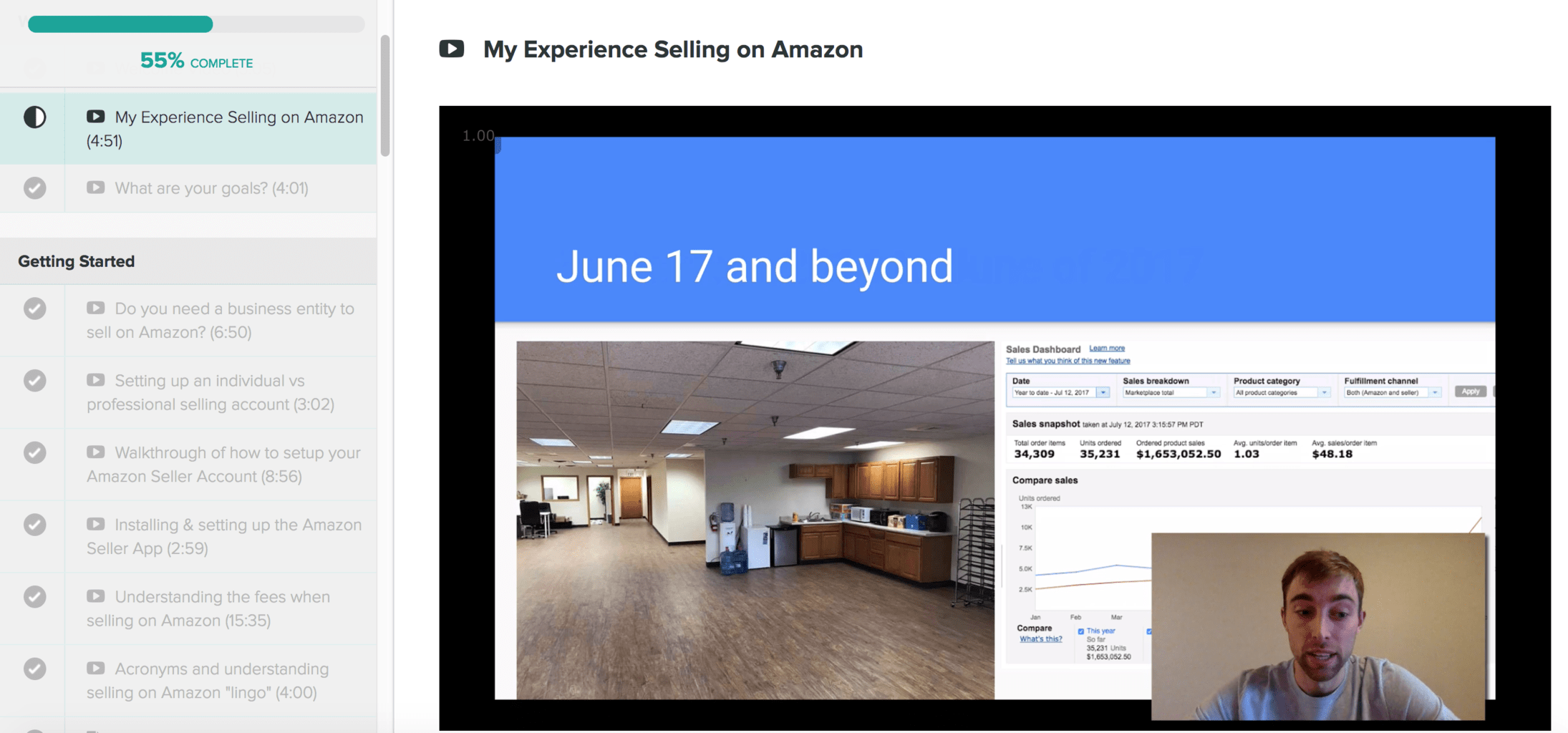
Will: What are you doing in yearly revenue from your Amazon store? What are your revenue goals or other goals moving forward?
Ryan: In 2018, we did about $5.9M in sales on Amazon.
Moving forward, we want to continue to expand the amount of inventory we source via wholesale, and to get more sales coming from channels other than Amazon. Those are the two main focuses for the online retail business in 2019.
Will: What is the one thing that you struggled with the most in Online Selling Experiment’s early days? What is the thing that you’re struggling the most with right now?
Ryan: An early struggle was getting people to read new content when I published it. It took some time to get people read on a regular basis, especially before I started an email list.
As for now, I’d say the biggest challenge is dealing with the volume of email, and putting systems in place so that I can have team members help with more of the inbound requests coming in.
Will: What three factors would you attribute Online Selling Experiment’s success to?
Ryan: In no particular order…
- Transparency – especially with sharing income reports on the site.
- Sharing actionable strategies – many of my posts include step-by-step instructions on exactly how to handle different aspects of running an online business.
- Our focus on delivering value to the reader over anything else – this has been my primary focus from the start.
Will: What are the three most important metrics that Online Selling Experiment monitors?
Ryan: Number of new email subscribers on a weekly basis, average time spent on site, conversion rates of sales pages.
Lifehacks, sources of inspiration, and tips on relaxation
Will: What is your favorite lifehack? (Business or non-business related).
Ryan: Earning travel miles through credit card sign up bonuses to be used for free travel. I haven’t paid for most of the travel I’ve done over the last 5 years.
Honorable mention: Ctrl / Command + Shift + T, for those of you who use Google Chrome. If you accidentally close a tab, this shortcut makes it reopen.
Will: Which entrepreneur, leader or business owner inspires you the most?

Ryan: There are many, but I’d say Tim Ferriss. I always find the content he shares interesting, and the number of people that he has exposed to new ways of thinking, and directly or indirectly led to starting new businesses is huge.
Will: What business tool would you find it hard to live without?
Ryan: Every tool I use in my business makes my life easier, but if I had to pick one, I would say WordPress. It makes it so easy to create websites, and create content that can be shared with as many people who are interested in reading it.
Will: If you had $100,000 to invest in one public company, what company would it be?
Ryan: That’s a good question. I don’t follow individual stocks too closely, and mainly just invest in index funds.

But if I have to pick one, I’d probably say Shopify. eCommerce is only going to continue to grow, and Shopify is currently the go-to application for most people looking to start an online store. If you’re not sure what eCommerce solution to pick, check out this comparison between BigCommerce and Shopify.
Will: What do you do to destress and relax?
Ryan: I’d do some type of physical activity, like playing basketball. I try to play about twice per week.
Other things for destressing & relaxing include: spending time with my girlfriend, family, and friends. Playing strategy board games, and being outdoors, especially if it involves being on or near the water. And I’d also say sleep, I always aim to get 7.5 or more hours of sleep per night.

